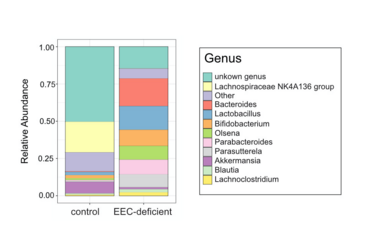Gut microbiota remodeling and intestinal adaptation to lipid malabsorption after enteroendocrine cell loss in adult mice
The enteroendocrine cells (EEC) and their hormones are known as essential regulators of the whole-body energy homeostasis and their absence during embryogenesis is life-threatening but there was no information on the physiological importance of the EEC system in adult mice. In an article published in Cellular and Molecular Gastroenterology and Hepatology, Gérard Gradwohl’s team, with scientists from the Enteric Nervous System in gut and brain disorders laboratory (Inserm), shed light on the intestinal adaptative mechanism following EEC loss. They showed that EEC-deficiency is not life-threatening unless mice are fed with a high-fat diet. In regular diet conditions, mice adapt to lipid malabsorption and stabilize weight loss by rapidly remodeling the gut microbiota and promoting the expression of genes involved in lipogenesis and carbohydrate metabolism. These studies may contribute to understand the pathophysiology and improve the treatment of human anendocrinosis to limit the need for parenteral nutrition.

Crédits : Gérard Gradwohl, IGBMC
